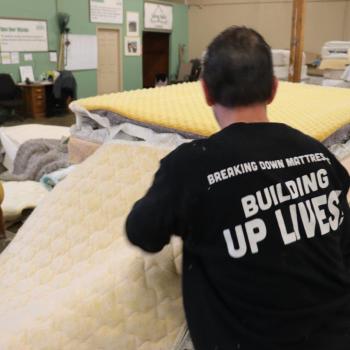Today, I’m pleased to host a guest post from Mellissa Thomas, who hails from Florida and blogs here. Check out her new devotional book (details follow this post)
————–
Does your life make you feel like a hamster on a wheel?
You go through the motions, tell your family you love them, go to church every Sunday, and sometimes a mid-week Bible study if your job permits. You pray, but squeeze it in between the other demands that scream for your attention. Maybe you try to pray right before bed…and end up falling asleep on God.
(Don’t feel bad. It gets the best of us.)
And the routine repeats when the alarm chimes the next day.
There’s more to life in Christ than that, isn’t there?
Yes.
The daily wheel makes you run, but it hinders your walk.
Barely fitting God in your schedule leaves you spiritually starved, and you can feel it too, because throughout the day, something inside you longs for His presence, His Word, His voice, or some encouragement.
Have you noticed you’re struggling in areas you normally don’t? Like with friends, who you normally get along with just fine, or at your job, something you already have plenty of expertise in, or with your kids, who you normally keep in check? Being spiritually starved leaves you vulnerable.
In Joyce Meyer’s words, “you can’t live on snacks. You need meat and vegetables [to grow].”
Here are your five steps to start growing.
Step 1: De-clutter your schedule. Your plans control your speed on the wheel. Assess your schedule and axe the things you don’t need to do or aren’t fruitful.
Step 2: Give Him some of your free time. God’s highest priority for you is your relationship with Him because you learn more of Him and His character with time, and you emerge refreshed and ready to change the world (as David discusses here, which is why pastors and evangelists stress seeking Him first thing in the morning.
During that time, you can pray, meditate (think on and mutter) on scripture verses, sing praises to Him, or silence yourself and listen for His voice in your spirit.
And the beauty of Jesus is His Spirit lives in you, so you’re not confined to one location. If you can’t meet with Him in the morning, you can in your car while you commute, or during your lunch break. Or, if you have kids, your best time may be right after they head for bed.
Step 3: Start your personal Bible study. It’s good to go to church each week, but you’ll need to read the Word daily for yourself (Joshua 1:7-8). If you don’t have a concordance yet, buy one, because it’s an essential Bible study tool. If you’ve never done this before, start researching verses on the most fundamental concept we all seem to miss: love, or God’s love.
Once you’ve written the verses, study and meditate on them. The Holy Spirit will begin to speak them back to you (a rhema word), and since you’re meditating, you’re saying them aloud as well. You’ll be amazed at the confidence you’ll gain when you’re frequently reminded that God loves you, and love covers a multitude of sins; that perfect love (which only Jesus has, which now lives inside you) casts out fear (1 John 4:18), and so on.
The unspoken perk of personal Bible study? You’ll hear God’s voice more often.
Many believers say they don’t hear God’s voice or can’t distinguish it from the noise in their minds. The more you study the Word, more the Holy Spirit will have to say to you, because He always gives a rhema word the moment you need it.
Also, when you have Biblical questions, don’t be afraid to ask around. Fellow believers are always happy to impart knowledge.
Step 4: Speak scriptures back to God in prayer. God loves it when you remind him of His promises in prayer. Not only does He see that you’re learning and leaning on His Word, but it also keeps you accountable: knowing the scriptures keeps you from praying outside His will (John 14:13-14). Plus, hearing those promises (in your mind or aloud) encourages you even as you pray.
Step 5: Do good for people, including yourself. Jesus tells us to love our neighbor as ourselves, and one of the most powerful ways to overcome struggles in your own life is to do good for someone else.
It can be as small as giving your next-door neighbor a gift or complimenting a stranger; or something bigger like volunteering in disaster relief efforts. God created us as relational beings, so when we bless others, we’re blessed, too.
Bonus tip: Believe by faith that every word in the Bible is true, even the things you’re unsure of. Until that happens, these five steps will have no value, because if one part of the Bible isn’t true for you, then none of it can be. Bring your questions to your pastor (if you attend church — some don’t), do research on sites like CARM.org, and watch in-depth speakers like Dr. Ravi Zacharias, Dr. Adrian Rogers, or Dr. David Jeremiah.
Spiritual growth is a lifelong process…
…but it’s not as complicated as it seems. The steps above are timeless. Circumstances in your life will change, so you’ll have to go back to Step 1 many times, but these will never fail you.
So as they say: lather, rinse, repeat.
What do you do to grow spiritually? What do you think the Church as a whole is missing in its growth?
—–
Mellissa Thomas is a Central Florida freelance writer and published author of From a Babe: A Weekly Devotional for New Believers and Those Hungry for Spiritual Growth in Christ, which has changed hundreds of lives in its first year. The From a Babe small group Bible study workbook releases on Amazon.com July 26, 2013. For more friendly encouragement, blogs here.













